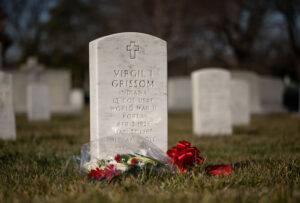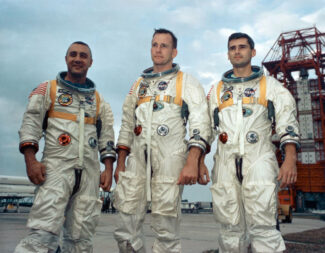Op-ed | Honor Our Fallen Space Pioneers This Memorial Day
By Brian Berger

This Memorial Day, as we remember American servicemen and women who gave their lives for their country, we should also recognize another group of patriots who also paid the ultimate price in service to the nation — our fallen astronauts. America’s astronaut corps — that elite community of brave space pioneers — represent the very best that our country has to offer. Unfortunately, twenty-two of these great Americans perished while serving in our nation’s space program.
From its earliest inception in the late 1940s, and under the direction of NASA starting in 1958 until now, America’s space program has been both challenging and ambitious, and continuously marked with significant uncertainty and monumental risk. Even with world-class training, testing, and simulation, and the deepest confidence in technology produced by the most brilliant technicians and engineers — venturing into space remains precarious. But for those who’ve worn the NASA patch, suited up, and strapped into a spacecraft, the prospect of accomplishment for both country and humankind was worth the risk.
In reciting the names of our fallen astronauts, we not only commit their lives to memory, but we recall the missions and incidents that caused their loss.

The Apollo 1 fire on Jan. 27, 1967, which killed Virgil “Gus” Grissom, Ed White and Roger B. Chaffee — sparked by an electrical fire fed by pure oxygen in the cabin of the spacecraft during a test — was the first major catastrophe in our space program. While tragic, the event had the effect of driving safety changes and procedures, likely enhancing the preservation of life on future missions.
The Challenger shuttle disaster on Jan. 28, 1986 took the lives of STS-51-L crew members Ronald McNair, Gregory Jarvis, Judith Resnik, Ellison Onizuka, Michael J. Smith, Dick Scobee and schoolteacher Christa McAuliffe. It was a tragedy of magnified resonance due to the large number of Americans who witnessed the explosion live — and much like Apollo I, post-incident investigations led to major changes in the shuttle program, and policies and processes at NASA.
On Feb. 1, 2003, the Columbia shuttle accident saw the loss of American astronauts Michael P. Anderson, Rick D. Husband, David M. Brown, William C. McCool, Kalpana Chawla, and Laurel Clark, as well as Israeli crew member Ilan Ramon. Damage to the shuttle’s thermal protection system caused the craft to disintegrate during reentry into Earth’s atmosphere. That mission, STS-107, had been Columbia’s 28th flight; Columbia was the first orbiter of the shuttle program to fly in space.
Like military exercises, training and testing operations for space missions often carry significant hazard — and several American astronauts have died performing test and training duties in support of the nation’s space program as well. Michael J. Adams, Elliot See, Charles Basset, Theodore Freeman, Clifton C. Williams, and Robert Henry Lawrence, Jr. unfortunately passed away while executing a variety of flight operations and tests.
In recognizing the contributions and sacrifice of America’s fallen astronauts, it is important to consider a few other things. First — most, if not the overwhelming majority of America’s early astronaut corps were military veterans, many selected right from active service. In fact, a great number of those early astronauts had already been in combat in World War II and Korea — and members of later NASA generations served valiantly in Vietnam. These people already put life and limb on the line before volunteering for the space program.

Second — it’s important to remember the historical context in which NASA was organized and the space program pursued. It was a central part of our existential conflict with the USSR and other communist states at the height of the Cold War. Not only were the missions extremely risky — in fact, pushing into uncharted territory with novel technology — but the overarching pressure to succeed on the global stage against our greatest geopolitical foes was immense. Americans who risked it all to serve in space believed in the cause, knew the stakes, and intimately understood the strategic implications of their mission and role.
Moving forward into the 21st century, it is doubly important that we recognize and remember these great citizens, who accepted the danger inherent in their duties and pushed the envelope to advance the high and noble purpose of the nation in space — for one reason: Because America is once again embarked on a course of significant objectives in space, and we are in fierce competition with other nations who are actively seeking to displace us in the skies above.
In many ways, we are in a new space race, reminiscent of that which occurred during the Cold War of the 20th Century. Americans will be called upon to serve, to face great odds in support of a new national mission, and to accept the idea that, in pushing farther into space, they might not come back.
At Arlington Cemetery — which is the final resting place for several astronauts, including many of those who died while in space program service — are two memorials dedicated to the Challenger and Columbia shuttle disasters. That these memorials have earned a place in America’s most hallowed grounds is a clear indicator of the importance of our astronaut community to national purpose, principles and prestige.

Finally, it is notable that this past week saw the 60th anniversary of President John F. Kennedy’s famous speech in which he called upon the Nation to press forth and get to the moon:
“We choose to go to the moon in this decade and do the other things, not because they are easy, but because they are hard, because that goal will serve to organize and measure the best of our energies and skills, because that challenge is one that we are willing to accept, one we are unwilling to postpone, and one which we intend to win, and the others, too.”
Of course, the effort to land on the Moon — as well as every other human spaceflight mission in America’s space program thereafter — would never have occurred or succeeded without significant sacrifice on the part of America’s finest and bravest — indeed, the sacrifice of some was total. It is for these reasons why the commercial space industry — especially companies that specialize in life support and safety — works so hard to protect the lives of astronauts who put full faith in their training and technology to claim new achievements beyond Earth.
So as we take a moment to reflect on the profound and eternal service of military veterans who gave their all to protect and preserve our way of life, let’s also remember the commitment and contributions of the astronauts who died in the course of America’s endeavors in space.
Remember their names, learn their stories, and honor our fallen space pioneers.
Barry W. Finger is the vice president of engineering at Paragon Space Development Corporation where he provides technical leadership and oversight of the engineering development process for the company’s flight programs. His career has focused on the development and implementation of affordable and robust life support and thermal control solutions for the human exploration and development of space.
May 29, 2021 at 05:30PM
via SpaceNews read more...

Post a Comment